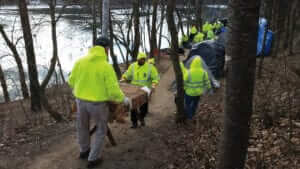A Charleston attorney gains national recognition for defending homeless rights.
A camp along the Elk River, home to some of Charleston’s most vulnerable men and women, was dismantled last year—the homeless campers forced to move on, their personal belongings thrown in the trash.

Attorney Sam Petsonk stood on the banks of the river and watched the scene unfold. Six months later, he was spearheading a legal challenge against Charleston Mayor Danny Jones and the city’s police department. Petsonk contended the city had violated the rights of Tent City residents. “We wanted the litigation to represent that what happened to the homeless was illegal and incorrect,” says Petsonk, a Morgantown native has spent much of his career representing low-income West Virginians, primarily in workers’ compensation cases.
Tent City had been a long-term community for its inhabitants—a community providing structure, rules, and safety. “The sense of loss of a homeplace and support for those folks was sudden. That was among the most significant concerns,” Petsonk says.
Speaking Up
John W. had been living in Tent City for five years with his wife. “That day was a very bad day for a lot of homeless people,” he says, his voice breaking. “The cops gave us five minutes to get what we could, pack up, and leave. We lost food, social security cards, pictures of our children.”
Mountain State Justice, a nonprofit law firm for which Petsonk is an attorney, has had a longstanding relationship with homeless service providers in Charleston, a city with more than 1,000 individuals living in shelters or on the streets.
Petsonk and his fellow attorneys first became involved with Tent City in summer 2014 when a camper walked into their Quarrier Street office and said police officers were threatening to shut down the campsite. Soon after the interaction, Charleston police agreed that they would notify Mountain State Justice and Tent City residents if an eviction was to occur, Petsonk says.
But a year and a half later, on January 9, 2016, without notifying the attorneys or the campers, Jones ordered city workers to dismantle Tent City, citing safety concerns in the 5 degree weather.

“Most (campers) did not stay around. Most had fled as soon as they could gather what they could carry on their backs. Being homeless is not a crime, but the homeless population is often misunderstood as a criminal population, so naturally homeless folks had concern when their encampment was swarmed by police.”
Jones told the media that he hoped the eviction would propel the campers, ranging from 18 years old to retirement age, to find help.
Petsonk began to document what had occurred and pursued legal action, acting as lead counsel on a class-action lawsuit filed by two of the campers. He worked with Mountain State Justice attorney Lydia Milnes, who has had a relationship with Tent City residents since 2014.
John was one of the plaintiffs on the suit, which claimed the eviction and the destruction of residents’ property had violated both the U.S. and state constitutions. “The United States of America’s intergovernmental policy on homelessness clearly states that it is improper to force the dispersal of homeless encampments,” the complaint reads in part, maintaining that such dispersal “accomplishes nothing toward the goal of linking people to permanent housing opportunities.”
Petsonk kept the suit shielded from the public and instead went directly to city officials in an attempt to collaborate for an outcome that would benefit the plaintiffs and the city. Beyond monetary restitution for members of Tent City, Petsonk hoped the suit would push the city to develop a protocol for any future encampment evictions. “The mayor’s office really engaged in conversation with the plaintiffs and the homeless services community to try to come up with a better approach,” Petsonk says.
John, who months before had been living in a tent by the river, found himself in front of the city’s leaders and homeless service providers to advocate for the homeless population. “Just because you’re homeless doesn’t mean you don’t have rights,” John says. “I was glad to speak up and let them know what was going on.”
The case never went to trial. Petsonk and city officials reached a settlement in August of this year, and the case was dismissed in September. The settlement included $20,000 for those evicted from Tent City, available for residents in $1,200 vouchers from local businesses.
An Evolving Situation
John and his wife are now in permanent housing. The media coverage of the eviction also resulted in him being reunited with his daughter. “If it wasn’t for Sam, none of this could have happened,” he says.

The case also spurred City Council to pass a homeless encampment policy that requires the city to give at least 14 days’ written notice to encampment residents and homeless services providers. The ordinance also bars the city from immediately throwing personal property into the trash.
Most notably, it requires the city and its service providers to provide permanent housing for the residents of the encampment—one of only two U.S. cities required to provide alternative housing prior to evicting an encampment.
The National Law Center on Homelessness and Poverty, a D.C.-based organization that supported Petsonk during the litigation, celebrated the success and invited Petsonk to speak at a national homelessness advocacy forum about the litigation. “Sam’s work represents a model we hope other communities can learn from and implement,” says Maria Foscarinis, executive director of the center.
On a conference call with the two men, Petsonk kept downplaying John’s praise—rather, he says it was John’s advocacy that brought about the suit’s success. But he hopes the suit’s strategy, allowing those experiencing homelessness to be at the forefront of public discussions, will be Charleston officials’ approach moving forward. “We are comfortable now with that conversation,” Petsonk says.
The city’s response to what officials call “a growing homelessness problem” is still evolving. In November, Charleston’s Homeless Task Force introduced two measures before City Council aimed at reducing the number of panhandlers. One measure would require anyone asking for money to obtain and display a permit.
Petsonk says these ordinances would be ineffective at combatting homelessness, as it would simply push people on the streets out of sight.
written by AMELIA FERRELL KNISELY









Leave a Reply